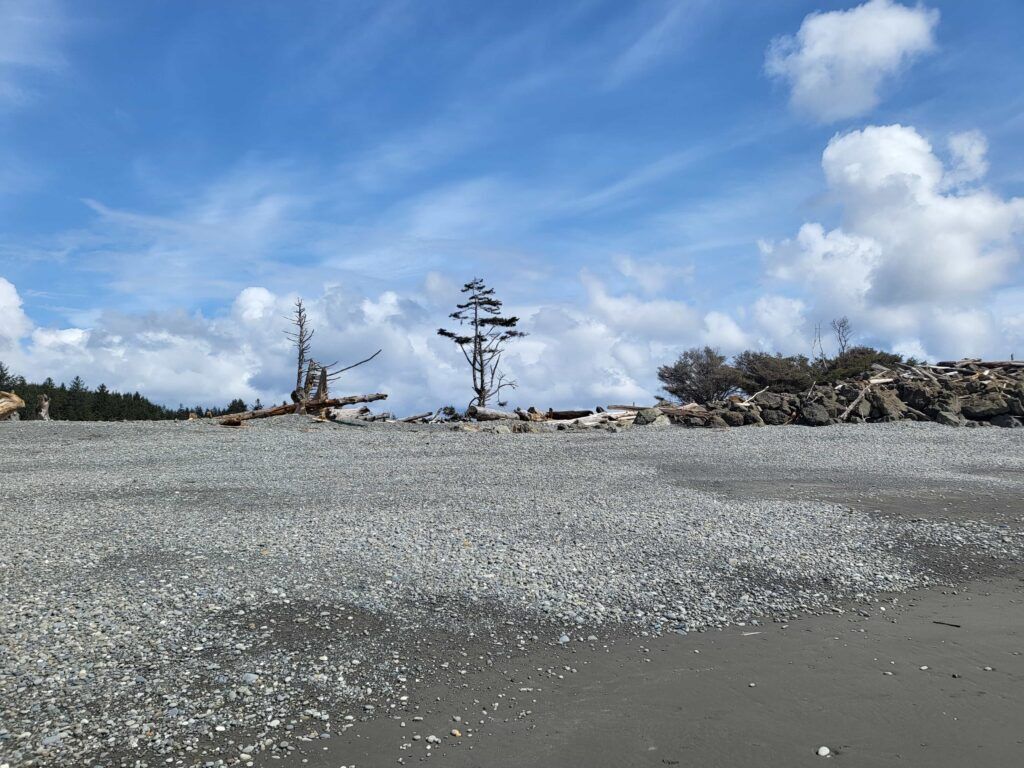
The sand bar at Taholah, Wash.
Orinda Goddard, Northwest Indian College, Nisqually Campus Faculty Member
2023-2024 Indigenous Visionaries Fellow
When I think back on when I grew up, I remember going on rides that seemed so long but now knowing they were four-hour round trip.
On many family trips, my mom would make sure that we spent time with our elders on both sides of her family. I am so grateful we did this, and I still visit elders in the communities I grew up knowing.
After being named to this cohort and being asked to write a blog, I wanted to interview my mom because of the leadership she role modeled in the way she raised me and my siblings. However, she did not want her picture to be published with my interview of her. I then decided to interview my aunt SueDee.
During spring break, I took my children and my mom to Taholah, Washington to interview my aunt. One important tradition I was told to keep was when working with elders to bring them a gift. I had a friend make a pair of earrings, and I brought her a plant and cooked lunch to share with her.
The sun and rock at the lookout at Taholah, Wash.
Celestine “SueDee” Hicks is 85 years old. Born in Hoopa, California, she moved to Taholah, Washington at age 15 because her grandparents (my great grandparents) were from there and they had a ranch. She married young, then worked as a teacher aid at the Taholah school. She received her general education certification (GED) and was promoted and received raises without having a degree. When she could not progress further in her career, she went to work in social services and enrolled in college to earn her bachelor’s degree in social services. It took her ten years to achieve her bachelor’s degree. She said it was a tough time for her with the drinking lifestyle and trying to raise her family. She was making $14 an hour and trying to provide for her five children.
Through her career in social services, she helped families in Native communities reunite their families. She collaborated with local companies to make sure families were receiving education classes to help with finances and job skills, food baskets, Christmas presents, and books for children and other resources that were not available to tribal families at that time.
Leaving our footprints where our ancestors once stood.
She started a feather tree. Children would write down their wishes and people from the community would help make their wishes come true. She developed resources to help families to gain important life skills, such as classes on how to make fishing nets, how to use the nets to catch fish, how to clean and filet fish, and how to smoke fish. Fishing was a big source of income in the area. Community members would come together to help one another; nobody went without. If someone had fish, they would share and help others.
Aunt SueDee enjoyed working in the social services department. She spoke about one case during our interview to share how things were back in the day. The parents did not finish high school and there were no resources available like there are now to get their children back. But these parents found a home, work, and were making progress towards getting their family back together. But the kids did not go back to their parents. People who were not working with these parents on a daily basis made the decision that the parents would not regain custody of their children. The next day after the decision police officers and ambulances surrounded their home and it was discovered one of the parents committed suicide.
This was rough! Fighting with the tribe! Getting beat down and no fight to give! So, you see, your clients lay down and play dead. People sometimes did not get good jobs or services due to who your family was or your status in the community.
Day of interview with Orinda and SueDe
SueDee has always been a member of the community that she lives in, but she also felt like an outsider because she was not an enrolled member in her earlier years. She talked about how the gatekeepers of tribes pushed for tribal members to get an education and then come back and work for the tribe. However, sometimes people could not get a job due to tribal politics, so they would find work with other tribes who would treat them better or work in non-Native companies/business or open their own businesses.
After my interview with SueDee, I took my children down to the beach to see the Pacific Ocean a mile away. I shared with my children that we were standing in the spot where our ancestors stood many generations before us. I asked them if they could imagine how their way of life was daily or seasonal. They said no. I know that this is something that my children will hold onto as a memory of who their family is and where they come from because that is something that I was shown as a young lady and that I held onto.
As I write I hope this honors my 85-year-old auntie SueDee Hicks and my mother, Jessie Goddard, for showing me how important our elders are and the stories they carry. They, like the others in the Indigenous Visionaries cohort, shared their stories of overcoming life’s obstacles, generational traumas, racism from non-Natives and from within their own communities, raising their families, passing down the traditions, culture, and language that were taught to them, empowering others, and using their voices with confidence.
SueDee in her home in Taholah, Wash.
